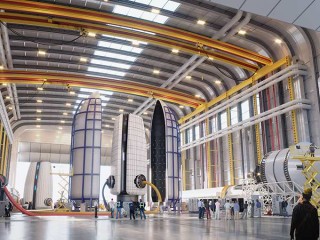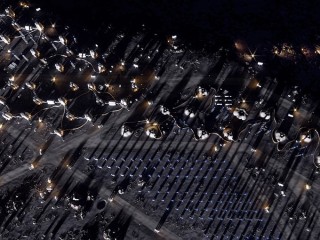Skidmore, Owings & Merrill (SOM), in partnership with the European Space Agency (ESA) and the Massachusetts Institute of Technology (MIT), has released the design. It is part of an new initiative to take mankind back to the moon - this time, with the aspiration to settle there on a permanent basis. With ESA and MIT, SOM is carrying out the masterplan, design and engineering for the settlement.
The concept presented by ESA director general Jan Woerner for the first full-time human habitat on the lunar surface.
“The project presents a completely new challenge for the field of architectural design,” said SOM design partner Colin Koop. “The Moon Village must be able to sustain human life in an otherwise uninhabitable setting. We have to consider problems that no one would think about on Earth, like radiation protection, pressure differentials, and how to provide breathable air.”
Solving these challenges requires cross-disciplinary collaboration, and a new way of approaching the space industry’s most complicated problems. ESA is providing a diverse range of expertise from the European Astronaut Centre and the European Space Research & Technology Centre. This experience is coupled with faculty from MIT’s Aerospace Engineering Department and SOM’s specialists in architecture, engineering, urban planning and sustainable design.
Resiliency and self-sufficiency are key, said SOM. The masterplan envisions the Moon Village on the rim of Shackleton Crater near the South Pole, which receives near continuous daylight throughout the lunar year. This planning is essential for the first of three envisioned development phases - several critical infrastructural components and habitable structures - that would allow the village to harness sunlight for energy and set up the generation of food and other life-sustaining elements.
Water from the permanently shadowed depressions near the South Pole would be extracted to create breathable air and rocket propellant for transportation and for the support of industrial activities.

The settlement would be clustered close to the crater’s water-ice deposits. In addition, each cluster of modules would be connected to enable seamless mobility between structures, with communications towers on the highest ridges of the uneven terrain.
The individual pressurized modules are designed to inflate and expand to increase user space for future growth and programme requirements. The concept calls for three- to four-storey structures, with workspaces, living quarters and environmental control and life support systems.
These inflatable structures would provide - together with protective shells - resistance to extreme temperatures, projectiles, dust and solar radiation. They would enable the Moon Village to carry out its much larger purpose as a scientific, industrial, and entertainment development, and an endeavour with far-reaching goals, said SOM.
Got a story? Email news@theconstructionindex.co.uk




